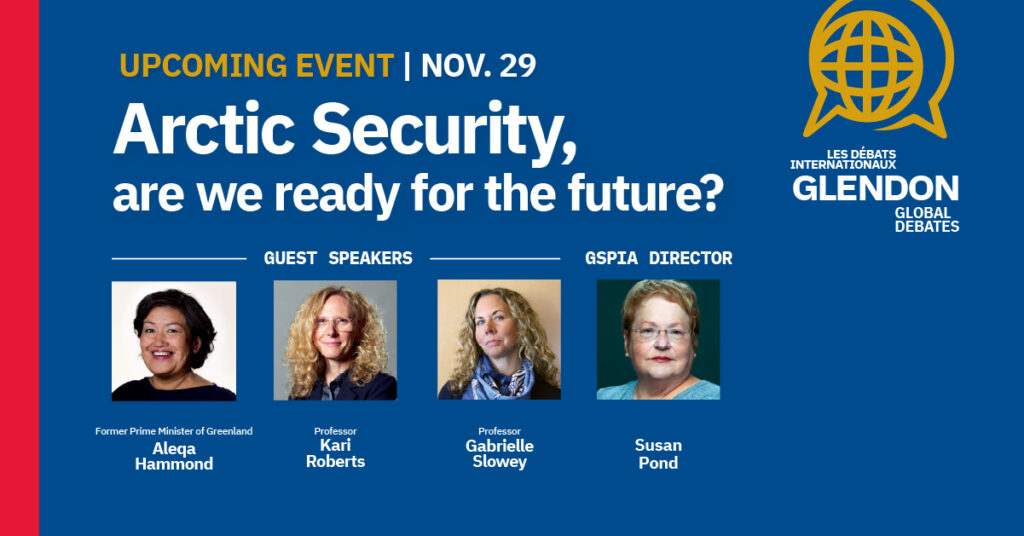
A panel of experts debate how to best prepare for the profound changes that lie ahead in the North
As the region risks becoming the new frontline for confrontation between global powers, the Glendon Global Debates return this month to examine the impact on the economic and social life of the people who call the Arctic home and for all those to the south.
The Arctic is warming faster than the global average making the prospect of ice-free Arctic waterways open to commercial traffic a possibility in the near future. Such an ice-free, east-west passage would establish the shortest route for the transfer of goods between the Atlantic and Pacific. These changes are being monitored closely by nations far from the Arctic. For example, China has declared itself to be a near-Arctic state.
Ms. Aleqa Hammond, former Prime Minister of Greenland, and a panelist at the upcoming event, contends that “Russia and China are already eyeing the Arctic and the region risks becoming the new frontline for confrontation between great powers.” Canada’s own Security Intelligence Service (CSIS) has warned Inuit leaders that foreign states could gain a foothold by offering to fill infrastructure gaps in the North.
Canada shares the arctic space with a number of other countries including Denmark, Greenland, Iceland, Finland, Norway, Sweden, Russia and the USA. Nearly 40% of Canada’s land mass is considered arctic and northern. Canada and Russia claim ownership of three quarters of the coastline. This represents more than 70% of Canada’s coastline.
Recently named the inaugural Fulbright Chair in Arctic Studies at Dartmouth College (USA), Professor Gabrielle Slowey now teaches courses in Canadian, Indigenous and Arctic Politics at York University. Her research investigates the intersection between indigenous people, governance, resource extraction and the environment. “There has to be a human dimension to Arctic security: people have to be part of the process, discussion and solution,” said Slowey who will also bring her unique perspective to the conversation.
The development of safe Arctic transportation routes also opens the possibility for increased economic development including resource extraction. These activities will have a profound impact on the economic and social life of the people who call the Arctic home, as well as those far beyond.
Professor Kari Roberts from Mount Royal University has made the study of Russia-West relations her life’s work and has spent many years studying Russia’s interests in the Arctic and what this means for Canada and NATO. “It is rarely in the interest of any state to disrupt geopolitical order. And it is even less advantageous for Arctic states, including Russia, to further undermine the historically peaceful and cooperative relationships in the region, which are now being tested in the current geopolitical moment,” said Roberts, who will join Hammond and Slowey on the panel.
Countries like Canada and Greenland have stated that the Arctic is central to their national identity, prosperity, security, values and interests. This conversation hosted by the Glendon Global Debates will explore what concrete actions should underpin these statements.
Moderated by Susan Pond, Director of the Glendon School of Public and International Affairs, this hybrid event will explore opportunities and possible threats afforded by a warming Arctic region.
As a bilingual institution in the heart of Toronto training future changemakers, Glendon is uniquely positioned to support leaders and communities in a forward-looking assessment of Canada’s role in global affairs. We are proud to promote participatory dialogue and contribute to creating positive change in the world.
Join us on November 29th, alongside our distinguished guests, and become a part of this crucial conversation.
For those wishing to join virtually, the debate will also be livestreamed. A link to the event will be shared with all registered participants via email a few hours prior to the event.
The debate will be conducted in English. We invite the audience to ask questions in either French or English.

